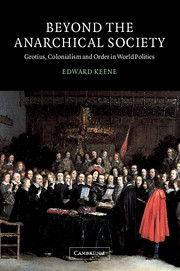Book contents
- Frontmatter
- Contents
- Preface
- Acknowledgements
- Introduction
- 1 The orthodox theory of order in world politics
- 2 The Grotian theory of the law of nations
- 3 Colonialism, imperialism and extra-European international politics
- 4 Two patterns of order in modern world politics: toleration and civilization
- 5 Order in contemporary world politics, global but divided
- Conclusion
- Bibliography
- Index
Preface
Published online by Cambridge University Press: 22 September 2009
- Frontmatter
- Contents
- Preface
- Acknowledgements
- Introduction
- 1 The orthodox theory of order in world politics
- 2 The Grotian theory of the law of nations
- 3 Colonialism, imperialism and extra-European international politics
- 4 Two patterns of order in modern world politics: toleration and civilization
- 5 Order in contemporary world politics, global but divided
- Conclusion
- Bibliography
- Index
Summary
As anyone who has studied international relations will probably be aware, the title of this book is a reference to Hedley Bull's famous work, The Anarchical Society: A Study of Order in World Politics. My use of a similar language is intended in part as a tribute to the power and insight of Bull's argument, and in part as a criticism of its limitations. Before I present my own perspective on order in world politics, then, I want to explain briefly why I attach so much importance to Bull's approach, and where I think he went wrong.
To my mind, the most attractive feature of Bull's work is his lucid defence of the view that in certain respects international relations are social relations, and that order in world politics should therefore be conceived as a form of social order. Bull developed this position primarily to challenge the popular belief that international relations should be understood in ‘Machiavellian’ or ‘Hobbesian’ terms. In other words, he was taking issue with the argument that, because the international system is anarchic, all states have to obey the brutal logic of Realpolitik and must devote themselves to the pursuit of their own national interests. Bull acknowledged that this perspective captures some aspects of international relations, as does an alternative ‘Kantian’ perspective that highlights the importance of transnational or ideological solidarity and conflict, but he insisted that neither tells us the whole story.
- Type
- Chapter
- Information
- Beyond the Anarchical SocietyGrotius, Colonialism and Order in World Politics, pp. ix - xiiPublisher: Cambridge University PressPrint publication year: 2002

